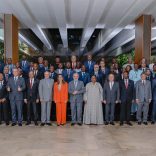Africa’s second-largest oil exporter may turn to the IMF amid oil price slump
Portugal: Covid-19 mutations are due to ‘selfishness of rich industrialised countries’ – ex-health director

File photo: Lusa
The former director-general of Health Francisco George attributes the unequal distribution of vaccines and medical treatments that has exposed vulnerable people to Covid-19, with the consequent mutations that now threaten the whole world, to the “selfishness of rich and industrialised countries”.
Speaking to Lusa regarding the identification of a new variant of the coronavirus that causes covid-19 (B.1.1.529), Francisco George expressed strong concern and regretted that vaccines have not reached the entire world population.
For the public health specialist, the fact that this new variant was detected in southern Africa, having initially been identified in South Africa, the country most affected by Covid-19 on the continent, is due to large concentrations of people and, above all, a high proportion of people with compromised immune responses, which are fundamental to stop the disease.
This insufficient immune response can result from chronic disease, from treatments that inhibit the immune system, but also from diseases such as HIV, with a high incidence in the region, tuberculosis and cancer, among others.
“The body’s defence antibody response is compromised due to these diseases, which gives more freedom to the viral particle to undergo changes in its composition,” he indicated.
The new variant results from several mutations in the spicule protein, which is responsible for the virus entering the body’s cells.
“This is a process that may explain the situation that has now arisen” in South Africa, said Francisco George, pointing to the demographic profile of continents such as Africa, where “poverty and inequalities are glaring”.
In the emergence of this new variant in Southern Africa, there is a phenomenon that is the “manifest selfishness on the part of the industrialised countries of the world”.
These richer, industrialised countries have solved problems related to financial flows, but not those of global health, he lamented.
Francis George criticised “the lack of solidarity of rich industrialised countries with countries plunged into crises of great poverty and difficulties, as is the case in these countries now most affected”.
“There has not been the care to invest in global health, despite the appeals of the Director-General of the World Health Organisation (WHO), who has insisted on the need to help countries that do not have the money to buy vaccines,” he lamented.
What is happening now, he explained, “is a consequence that could have been avoided if, at the beginning, concern about the distribution of means had been taken into account”.
For Francisco George, there is still much to know about the variant B.1.1.529.
“It is necessary to strengthen the means of laboratory surveillance of the viruses and coronaviruses that circulate. It is necessary to mobilise reservists and invest, but really invest, for the laboratory-based surveillance system, especially the one centred at the National Institute of Health Dr Ricardo Jorge (INSA),” he said.
Since the beginning of the pandemic, there have been variants Alpha (identified in the United Kingdom), Beta (South Africa), Gama (Brazil), Delta (India) and now the B.1.1.529, still unnamed, identified so far in South Africa, Botswana, Hong Kong and Israel.
Francisco George underlines that “the full range of consequences that this mutation may represent is not yet known”.
And leaves the warning: “It is early for alarm, it is time to alert, to monitor the sequencing of virus proteins in the laboratory.
“Vaccination should continue, as it continues to have advantages, until the pharmaceutical industry can produce vaccines capable of ensuring protection against this new variant, if necessary,” he said.













Leave a Reply
Be the First to Comment!
You must be logged in to post a comment.
You must be logged in to post a comment.